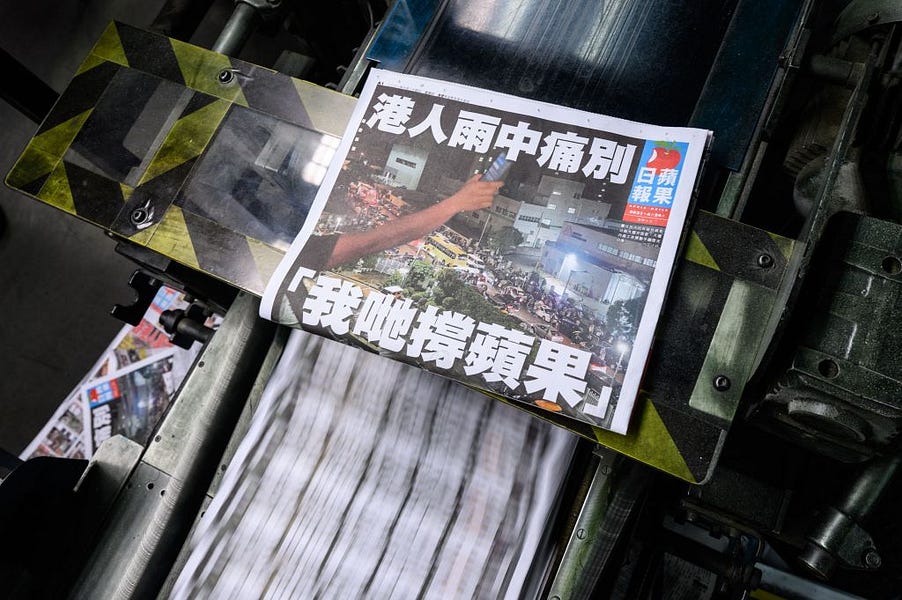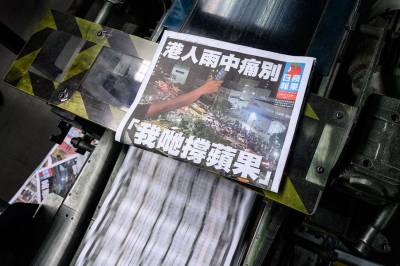Apple Daily, one of Hong Kong’s largest newspapers and the only one to uphold a pro-democracy editorial line, has been forced to close despite having tens of millions of dollars in its bank accounts that would have allowed it to keep operating.
The funds that would have paid staff and vendors were frozen by the Hong Kong government using the unfettered powers provided by the National Security Law Beijing imposed on Hong Kong in June 2020. Simultaneously, Secretary for Security John Lee sent in hundreds of policemen to arrest its top editors and executives and confiscate articles the government calls evidence of “foreign collusion.” (Lee was sanctioned by the United States last year for undermining Hong Kong’s autonomy and restricting freedoms.)
Jimmy Lai, the paper’s founder, is already in jail, facing multiple national security prosecutions and serving prison sentences for peaceful protests he joined in 2019. For good measure, the National Security Law prescribes jail terms for bankers who might dare to respect the property of their account holders.
These extraordinary actions against a major newspaper and its staff are a calamitous blow not only to the freedom of the press but also to Hong Kong’s status as an international financial center. The forced closure of Apple Daily, a private company, lacked any due process or any other aspect of the rule of law for which Hong Kong is known. After the seizure of company accounts, Mark Simon, an adviser to Jimmy Lai, told CNN, “We have not had a court decision against us yet…. These are all orders from the secretary of security. We are facing a security agency; we are not facing courts.”
Global companies have thrived on the attributes that have made Hong Kong uniquely attractive to businesses among Chinese cities. None of these—the freedom of press and transparency of corporate information, low taxes and freely convertible currency, well-developed stock market, good flight connections, English as the official language, and of course the rule of law—are replicable in mainland cities.
China’s repression in Hong Kong is already having an impact on how the city is viewed by foreign businesses. Since the imposition of the National Security Law, whether to stay in Hong Kong or leave has become a major preoccupation. A survey of its members by the American Chamber of Commerce in Hong Kong conducted in May indicates some 42 percent are considering leaving. However, some businesses, including banks like Citibank and HSBC, appear unaffected by the pall descending over Hong Kong, transferring in top staff and doubling down on their business in China.
Apparently, some businessmen believe their lives will be easier without Apple Daily and a free press. A journalist for the Financial Times, invited to discuss the crackdown on Hong Kong’s with Hong Kong based businessmen, learned that “executives from democratic societies said they viewed the free press as their greatest enemy. To them the problem was not the erosion of rights and freedoms in what was one of the world’s most dynamic financial centres. The problem was pesky journalists who dared to report on these developments, thereby convincing head office to stop investing in the city.”
That is shortsighted at best. As the distinction between the judicial systems in Hong Kong and the mainland is overridden by Beijing, foreign and local Hong Kong companies will be vulnerable to mainland political and business pressures. Even corporate research negatively assessing a company with political clout in Beijing might be accused of violating national security. Nor can expatriates be sure they will continue to enjoy the personal security they have had in Hong Kong. Consider the case of Samuel Bickett, a corporate lawyer there who intervened to defend a youth being hit by a man with a baton, only to discover the assailant was a policeman. Bickett, the Washington Postreports, is in jail, denied bail, until his sentencing in July, and he is no longer employed by Bank of America Merrill Lynch. Similar ordeals are all but certain to increase as the rule of law is replaced by a national security apparatus untethered to an independent judiciary.
Businesspeople may feel they can sidestep landmines and moral quandaries by indulging Beijing in the way Taiwan is described on an airline website, or by firing an employee for a tweet about Tibet. But these are examples of a much larger problem. Chinese Communist leaders’ perceptions of their interests are expanding, not contracting, to include not only new geographic areas, like the South China Sea and northeast India but also the party’s definition of human rights and national security. Moreover, the party has long insisted on its right to seize and repatriate its citizens abroad and does so. Article 38 of the National Security Law purports to make its provisions applicable to anyone, anywhere.
Maybe that’s why Andrew Ross Sorkin of CNBC, anticipating a trip to China as part of NBC’s contract to broadcast the 2022 Winter Olympic Games in Beijing, went so easy on Alibaba Group co-founder Joe Tsai in an interview on Sorkin’s Squawk Box this month. Sorkin said nothing when Tsai, who is also an owner of the Brooklyn Nets, justified the escalating repression in Hong Kong with reference to China’s historic grievances over colonialism and the 19th century opium wars. Tsai is also a major donor to the Yale Law School, giving $30 million for work devoted to “increasing the understanding of China in the United States.”
China used to be seen as the Wild West—a frontier for enterprising people willing to take the greatest risks to reap the greatest rewards. But the risks have grown exponentially, and the areas where Beijing is willing to use its powers ruthlessly is expanding. The contest between free and repressive regimes is the defining issue of our times. It has spread to Hong Kong. Businesses there cannot avoid the implications, however much they wish they could.
Ellen Bork is president of the Committee for Freedom in Hong Kong and a contributing editor at American Purpose.






Please note that we at The Dispatch hold ourselves, our work, and our commenters to a higher standard than other places on the internet. We welcome comments that foster genuine debate or discussion—including comments critical of us or our work—but responses that include ad hominem attacks on fellow Dispatch members or are intended to stoke fear and anger may be moderated.
With your membership, you only have the ability to comment on The Morning Dispatch articles. Consider upgrading to join the conversation everywhere.